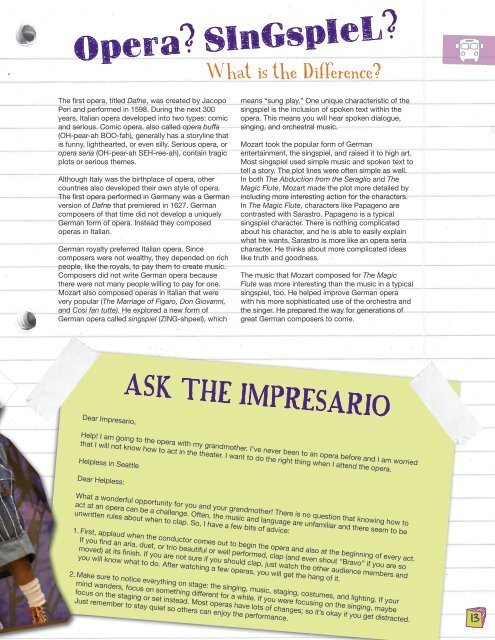You also want an ePaper? Increase the reach of your titles
YUMPU automatically turns print PDFs into web optimized ePapers that Google loves.
The first opera, titled Dafne, was created by Jacopo<br />
Peri and performed in 1598. During the next 300<br />
years, Italian opera developed into two types: comic<br />
and serious. Comic opera, also called opera buffa<br />
(OH-pear-ah BOO-fah), generally has a storyline that<br />
is funny, lighthearted, or even silly. Serious opera, or<br />
opera seria (OH-pear-ah SEH-ree-ah), contain tragic<br />
plots or serious themes.<br />
Although Italy was the birthplace <strong>of</strong> opera, other<br />
countries also developed their own style <strong>of</strong> opera.<br />
The first opera performed in Germany was a German<br />
version <strong>of</strong> Dafne that premiered in 1627. German<br />
composers <strong>of</strong> that time did not develop a uniquely<br />
German form <strong>of</strong> opera. Instead they composed<br />
operas in Italian.<br />
German royalty preferred Italian opera. Since<br />
composers were not wealthy, they depended on rich<br />
people, like the royals, to pay them to create music.<br />
Composers did not write German opera because<br />
there were not many people willing to pay for one.<br />
Mozart also composed operas in Italian that were<br />
very popular (The Marriage <strong>of</strong> Figaro, Don Giovanni,<br />
and Così fan tutte). He explored a new form <strong>of</strong><br />
German opera called singspiel (ZING-shpeel), which<br />
Dear Impresario,<br />
What is the Difference?<br />
means “sung play.” One unique characteristic <strong>of</strong> the<br />
singspiel is the inclusion <strong>of</strong> spoken text within the<br />
opera. This means you will hear spoken dialogue,<br />
singing, and orchestral music.<br />
Mozart took the popular form <strong>of</strong> German<br />
entertainment, the singspiel, and raised it to high art.<br />
Most singspiel used simple music and spoken text to<br />
tell a story. The plot lines were <strong>of</strong>ten simple as well.<br />
In both The Abduction from the Seraglio and The<br />
Magic Flute, Mozart made the plot more detailed by<br />
including more interesting action for the characters.<br />
In The Magic Flute, characters like Papageno are<br />
contrasted with Sarastro. Papageno is a typical<br />
singspiel character. There is nothing complicated<br />
about his character, and he is able to easily explain<br />
what he wants. Sarastro is more like an opera seria<br />
character. He thinks about more complicated ideas<br />
like truth and goodness.<br />
The music that Mozart composed for The Magic<br />
Flute was more interesting than the music in a typical<br />
singspiel, too. He helped improve German opera<br />
with his more sophisticated use <strong>of</strong> the orchestra and<br />
the singer. He prepared the way for generations <strong>of</strong><br />
great German composers to come.<br />
ASK THE IMPRESARIO<br />
Help! I am going to the opera with my grandmother. I’ve never been to an opera before and I am worried<br />
that I will not know how to act in the theater. I want to do the right thing when I attend the opera.<br />
Helpless in Seattle<br />
Dear Helpless:<br />
What a wonderful opportunity for you and your grandmother! There is no question that knowing how to<br />
act at an opera can be a challenge. Often, the music and language are unfamiliar and there seem to be<br />
unwritten rules about when to clap. So, I have a few bits <strong>of</strong> advice:<br />
1. First, applaud when the conductor comes out to begin the opera and also at the beginning <strong>of</strong> every act.<br />
If you find an aria, duet, or trio beautiful or well performed, clap (and even shout “Bravo” if you are so<br />
moved) at its finish. If you are not sure if you should clap, just watch the other audience members and<br />
you will know what to do. After watching a few operas, you will get the hang <strong>of</strong> it.<br />
2. Make sure to notice everything on stage: the singing, music, staging, costumes, and lighting. If your<br />
mind wanders, focus on something different for a while. If you were focusing on the singing, maybe<br />
focus on the staging or set instead. Most operas have lots <strong>of</strong> changes; so it’s okay if you get distracted.<br />
Just remember to stay quiet so others can enjoy the performance.<br />
<strong>13</strong>




